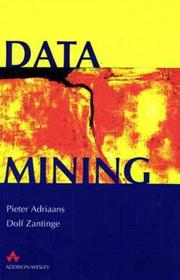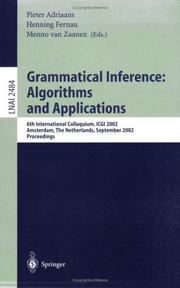| Listing 1 - 10 of 10 |
Sort by
|
Book
Year: 1956 Publisher: The Hague : Martinus Nijhoff,
Abstract | Keywords | Export | Availability | Bookmark
 Loading...
Loading...Choose an application
- Reference Manager
- EndNote
- RefWorks (Direct export to RefWorks)

ISBN: 0201403803 Year: 1996 Publisher: Harlow Addison-Wesley
Abstract | Keywords | Export | Availability | Bookmark
 Loading...
Loading...Choose an application
- Reference Manager
- EndNote
- RefWorks (Direct export to RefWorks)
Computer network architectures --- Computer organization --- Database management --- Algorithmes --- Réseaux d'ordinateurs --- Bases de données --- Architectures --- Conception et construction --- Data mining. --- Réseaux d'ordinateurs --- Bases de données --- Information systems --- Database management. --- Computer algorithms --- Ordinateurs --- Gestion
Book
ISBN: 9090055355 Year: 1992
Abstract | Keywords | Export | Availability | Bookmark
 Loading...
Loading...Choose an application
- Reference Manager
- EndNote
- RefWorks (Direct export to RefWorks)
Book
Year: 1992 Publisher: Amsterdam
Abstract | Keywords | Export | Availability | Bookmark
 Loading...
Loading...Choose an application
- Reference Manager
- EndNote
- RefWorks (Direct export to RefWorks)
Book
ISBN: 9780444517265 044451726X 9780080930848 0080930840 1282285858 9781282285859 9786612285851 6612285850 Year: 2008 Volume: 8 Publisher: Amsterdam: North-Holland,
Abstract | Keywords | Export | Availability | Bookmark
 Loading...
Loading...Choose an application
- Reference Manager
- EndNote
- RefWorks (Direct export to RefWorks)
Information is a recognized fundamental notion across the sciences and humanities, which is crucial to understanding physical computation, communication, and human cognition. The Philosophy of Information brings together the most important perspectives on information. It includes major technical approaches, while also setting out the historical backgrounds of information as well as its contemporary role in many academic fields. Also, special unifying topics are high-lighted that play across many fields, while we also aim at identifying relevant themes for philosophical reflection. There is no established area yet of Philosophy of Information, and this Handbook can help shape one, making sure it is well grounded in scientific expertise. As a side benefit, a book like this can facilitate contacts and collaboration among diverse academic milieus sharing a common interest in information.
Theory of knowledge --- Philosophy of science --- Information theory --- Philosophy. --- Philosophy --- Mental philosophy --- Humanities --- Communication theory --- Communication --- Cybernetics --- Information theory - Philosophy
Book
ISBN: 9055900028 Year: 1994 Publisher: Leidschendam : Lansa,
Abstract | Keywords | Export | Availability | Bookmark
 Loading...
Loading...Choose an application
- Reference Manager
- EndNote
- RefWorks (Direct export to RefWorks)
Digital
ISBN: 9780444517265 044451726X 9780080930848 0080930840 1282285858 9781282285859 9786612285851 6612285850 Year: 2008 Publisher: Amsterdam Elsevier
Abstract | Keywords | Export | Availability | Bookmark
 Loading...
Loading...Choose an application
- Reference Manager
- EndNote
- RefWorks (Direct export to RefWorks)
Information is a recognized fundamental notion across the sciences and humanities, which is crucial to understanding physical computation, communication, and human cognition. The Philosophy of Information brings together the most important perspectives on information. It includes major technical approaches, while also setting out the historical backgrounds of information as well as its contemporary role in many academic fields. Also, special unifying topics are high-lighted that play across many fields, while we also aim at identifying relevant themes for philosophical reflection. There is no established area yet of Philosophy of Information, and this Handbook can help shape one, making sure it is well grounded in scientific expertise. As a side benefit, a book like this can facilitate contacts and collaboration among diverse academic milieus sharing a common interest in information. . First overview of the formal and technical issues involved in the philosophy of information . Integrated presentation of major mathematical approaches to information, form computer science, information theory, and logic . Interdisciplinary themes across the traditional boundaries of natural sciences, social sciences, and humanities.
Book
Year: 2007 Publisher: Amsterdam University of Amsterdam
Abstract | Keywords | Export | Availability | Bookmark
 Loading...
Loading...Choose an application
- Reference Manager
- EndNote
- RefWorks (Direct export to RefWorks)
Dissertation
Abstract | Keywords | Export | Availability | Bookmark
 Loading...
Loading...Choose an application
- Reference Manager
- EndNote
- RefWorks (Direct export to RefWorks)

ISBN: 3540457909 3540442391 Year: 2002 Publisher: Berlin, Heidelberg : Springer Berlin Heidelberg : Imprint: Springer,
Abstract | Keywords | Export | Availability | Bookmark
 Loading...
Loading...Choose an application
- Reference Manager
- EndNote
- RefWorks (Direct export to RefWorks)
The Sixth International Colloquium on Grammatical Inference (ICGI2002) was held in Amsterdam on September 23-25th, 2002. ICGI2002 was the sixth in a series of successful biennial international conferenceson the area of grammatical inference. Previous meetings were held in Essex, U.K.; Alicante, Spain; Mo- pellier, France; Ames, Iowa, USA; Lisbon, Portugal. This series of meetings seeks to provide a forum for the presentation and discussion of original research on all aspects of grammatical inference. Gr- matical inference, the process of inferring grammars from given data, is a ?eld that not only is challenging from a purely scienti?c standpoint but also ?nds many applications in real-world problems. Despite the fact that grammatical inference addresses problems in a re- tively narrow area, it uses techniques from many domains, and is positioned at the intersection of a number of di?erent disciplines. Researchers in grammatical inference come from ?elds as diverse as machine learning, theoretical computer science, computational linguistics, pattern recognition, and arti?cial neural n- works. From a practical standpoint, applications in areas like natural language - quisition, computational biology, structural pattern recognition, information - trieval, text processing, data compression and adaptive intelligent agents have either been demonstrated or proposed in the literature. The technical program included the presentation of 23 accepted papers (out of 41 submitted). Moreover, for the ?rst time a software presentation was or- nized at ICGI. Short descriptions of the corresponding software are included in these proceedings, too.
Formal languages --- Logic, Symbolic and mathematical --- Algebra --- Mathematics --- Physical Sciences & Mathematics --- Computer science. --- Programming languages (Electronic computers). --- Computer logic. --- Mathematical logic. --- Artificial intelligence. --- Computational linguistics. --- Computer Science. --- Language Translation and Linguistics. --- Programming Languages, Compilers, Interpreters. --- Artificial Intelligence (incl. Robotics). --- Mathematical Logic and Formal Languages. --- Logics and Meanings of Programs. --- Natural language processing (Computer science). --- Logic design. --- Natural Language Processing (NLP). --- Artificial Intelligence. --- Informatics --- Science --- NLP (Computer science) --- Artificial intelligence --- Electronic data processing --- Human-computer interaction --- Semantic computing --- Design, Logic --- Design of logic systems --- Digital electronics --- Electronic circuit design --- Logic circuits --- Machine theory --- Switching theory --- AI (Artificial intelligence) --- Artificial thinking --- Electronic brains --- Intellectronics --- Intelligence, Artificial --- Intelligent machines --- Machine intelligence --- Thinking, Artificial --- Bionics --- Cognitive science --- Digital computer simulation --- Logic machines --- Self-organizing systems --- Simulation methods --- Fifth generation computers --- Neural computers --- Computer science logic --- Algebra of logic --- Logic, Universal --- Mathematical logic --- Symbolic and mathematical logic --- Symbolic logic --- Algebra, Abstract --- Metamathematics --- Set theory --- Syllogism --- Computer languages --- Computer program languages --- Computer programming languages --- Machine language --- Languages, Artificial --- Natural language processing (Computer science) --- Programming languages (Electronic computers) --- Logic, Symbolic and mathematical.
| Listing 1 - 10 of 10 |
Sort by
|

 Search
Search Feedback
Feedback About UniCat
About UniCat  Help
Help News
News